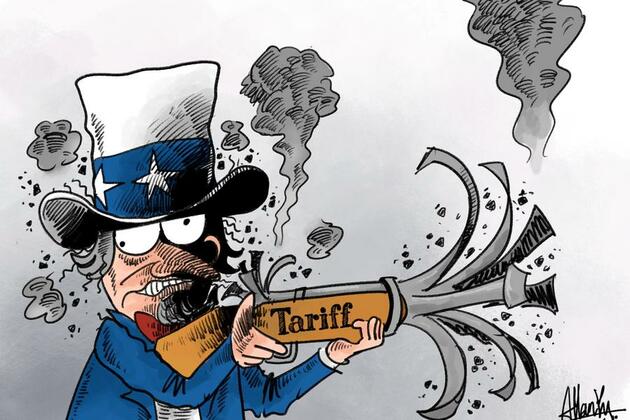Column: Misinformation or miscalculation -- Evaluating American tariff policy and its global consequences
Xinhua
11 Jun 2025, 15:16 GMT+10

Economic policy must not be driven by populist slogans or short-term political gains.
by Zheng Yin
U.S. officials have been vigorously promoting Trump's tariff policy recently. Last month, White House Press Secretary Karoline Leavitt tweeted on X: "American manufacturers overwhelmed with orders after Trump's crackdown on China."
The tweet quickly sparked debate. While some heralded it as proof that trade toughness has paid off, the reality behind such optimism is far more complex. It reflects a broader narrative of economic nationalism that, while politically potent, often overlooks basic economic logic and long-term strategic thinking.
At the core of the United States' trade approach lies "reciprocal tariffs" -- the idea that the country should mirror foreign tariffs with equal or greater duties of its own. Though this might sound like fair play, international trade is not a zero-sum game. It's an intricate system built on multilateral agreements, economic interdependence and global rules. Imposing tariffs unilaterally, without regard for these structures, disrupts markets and undermines the U.S. credibility in global trade.
Moreover, the logic behind these tariffs has significant flaws. They treat trade deficits as inherently bad and assume that tariffs can correct them. In reality, trade deficits are shaped by macroeconomic forces -- currency strength, savings rates and capital flows -- not merely tariff schedules. Punitive tariffs aimed at "fixing" trade deficits address only symptoms, not causes.
Ironically, the tariffs ended up harming many of the U.S. industries they were intended to protect. China responded with firm countermeasures, imposing its own tariffs on U.S. goods -- especially agricultural products -- hurting American farmers and manufacturers alike. Despite claims like "trade wars are easy to win," and Leavitt's assertion that U.S. factories are overwhelmed with orders, data tell another story.
Washington was forced to spend billions in subsidies to offset farm losses, while companies struggled with rising costs of imported parts. The net effect has been supply chain chaos, business uncertainty and a lack of any clear strategic gain.
Leavitt's tweet underscores the U.S. government's reluctance to acknowledge these failures. Even in the face of weak economic data, they continue to frame tariffs as strong negotiating tools. In practice, however, the policy has been reactive and incoherent -- a political tactic rather than a comprehensive strategy.
Globally, these policies have triggered a reevaluation of the U.S. trade relationship. Countries are pivoting away from reliance on the U.S. market, investing instead in regional integration. The EU and Japan have signed a free trade agreement, Britain is deepening ties with India, and Asia is advancing the Regional Comprehensive Economic Partnership (RCEP). Trade is moving toward a more multipolar, less U.S.-centric model -- an outcome likely unintended by Washington.
China, as the world's second-largest economy and largest trading nation, has taken a principled and measured stance. It firmly opposes U.S. unilateralism and protectionism, calling such tariffs a form of economic coercion that destabilizes global markets. China has implemented targeted counter-tariffs, expanded its free trade partnerships and increased domestic support for innovation and industrial upgrading. In Q1 2025, China's economy grew by 5.4 percent, and its trade surplus continued to expand -- a testament to its adaptive strategies and long-term resilience.
Furthermore, recent U.S.-China consultations in Geneva signal a potential path back to dialogue. China has reiterated its position: negotiations must be based on mutual respect, equality and mutual benefit -- principles essential for any sustainable resolution.
Economic policy must not be driven by populist slogans or short-term political gains. America's tariff-first approach may rally a political base, but it has delivered few tangible outcomes. Sustainable trade policy must be grounded in transparency, cooperation and global norms -- values that stand in stark contrast to the unilateral approaches seen in recent years.
Leavitt's optimistic tone may capture headlines, but without facts to back it up, such claims ring hollow. The pressing question now is whether the United States can learn from this chapter and chart a more balanced and forward-looking path in global trade.
Editor's note: The author is an international affairs observer.
The views expressed in this article are those of the author and do not necessarily reflect the positions of Xinhua News Agency.
 Share
Share
 Tweet
Tweet
 Share
Share
 Flip
Flip
 Email
Email
Watch latest videos
Subscribe and Follow
Get a daily dose of Birmingham News news through our daily email, its complimentary and keeps you fully up to date with world and business news as well.
News RELEASES
Publish news of your business, community or sports group, personnel appointments, major event and more by submitting a news release to Birmingham News.
More InformationBusiness
SectionOil prices flat amid trade talks and rising OPEC+ output
NEW YORK CITY, New York: Oil prices remained steady on June 9 as investors looked ahead to the outcome of the U.S.-China trade talks...
Coal vs. water: India’s energy push fuels local shortages
CHANDRAPUR/SOLAPUR (India): As India doubles down on coal to fuel its growing energy needs, an invisible crisis is surfacing: the country...
Nasdaq Composite climbs 124 points on China-U.S. trade talks optimism
NEW YORK, New York - U.S. stock markets rose Tuesday as investors and traders anticipated a positive outcome from ongoing trade talks...
Beijing approves rare earth shipments to top three US automakers
BEIJING/WASHINGTON, D.C.: In a rare move aimed at easing mounting supply chain pressure, China has issued temporary export licenses...
UBS faces $26B capital demand under Swiss post-crisis plan
BERN, Switzerland: UBS faces a sweeping new capital requirement from the Swiss government, which this week proposed changes that could...
Inside the viral world of Walmart’s high-paid cake artists
NEW YORK CITY, New York: At a Walmart Supercenter in New Jersey, buttercream borders and edible-ink cartoons aren't just about sweet...
United Kingdom
SectionFSB claims Russian professors linked to British Council espionage
MOSCOW, Russia: Russia's principal security agency, the Federal Security Service (FSB), has accused British intelligence of using the...
Electric aircraft lands at JFK as Beta hits major milestone
SOUTH BURLINGTON, Vermont: Beta Technologies has become the first U.S. company to land an all-electric aircraft at an airport in the...
Britain outlaws single-use vapes over health and litter fears
LONDON, UK: As of this month, it's officially illegal to buy disposable vapes anywhere in the United Kingdom. The new ban, aimed...
Column: Misinformation or miscalculation -- Evaluating American tariff policy and its global consequences
Economic policy must not be driven by populist slogans or short-term political gains. by Zheng Yin U.S. officials have been vigorously...
Column: China's vigorous development drives world's growth
The vigorous Chinese economy is one of the major drivers of the world's growth. China has contributed at least 30 percent to the world's...
Leaders pay tribute to freedom fighter Ram Prasad Bismil on his birth anniversary
New Delhi [India], June 11 (ANI): Congress president Mallikarjun Kharge on Wednesday paid heartfelt tributes to the legendary freedom...












